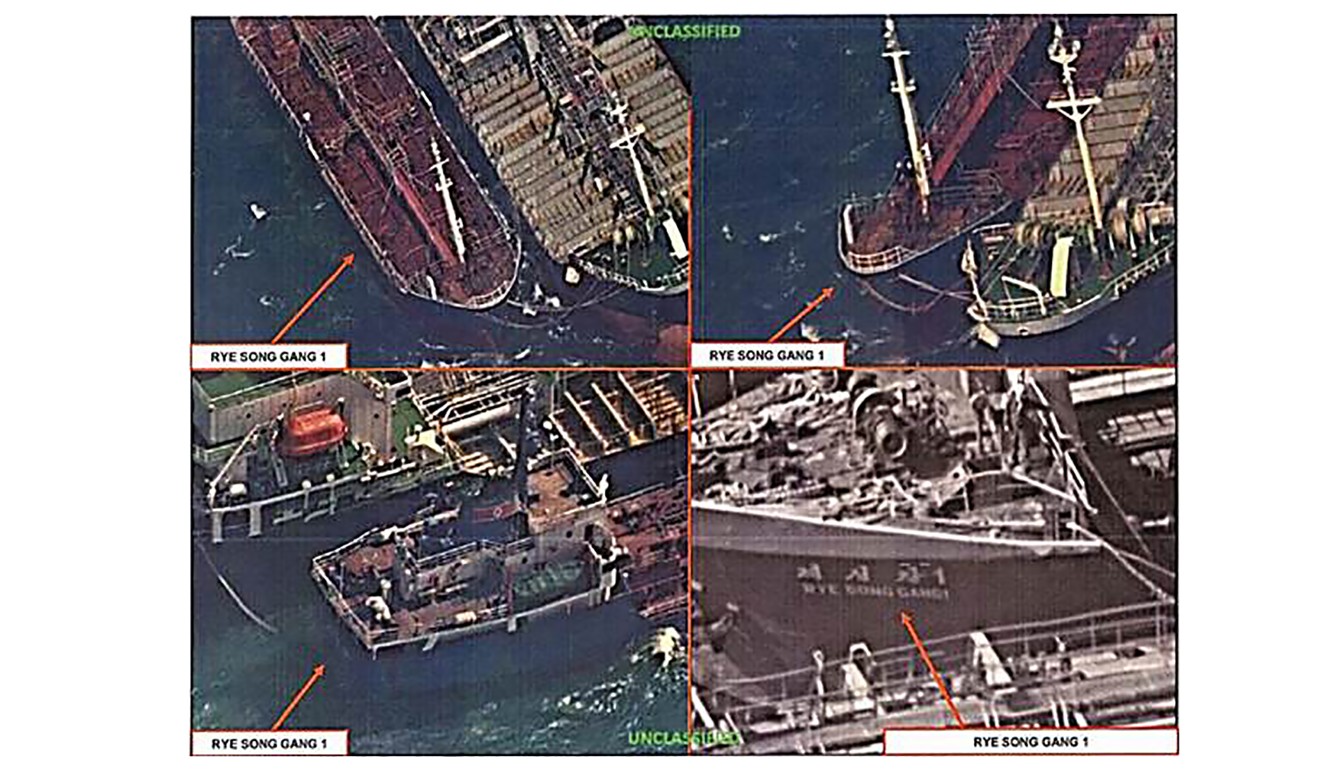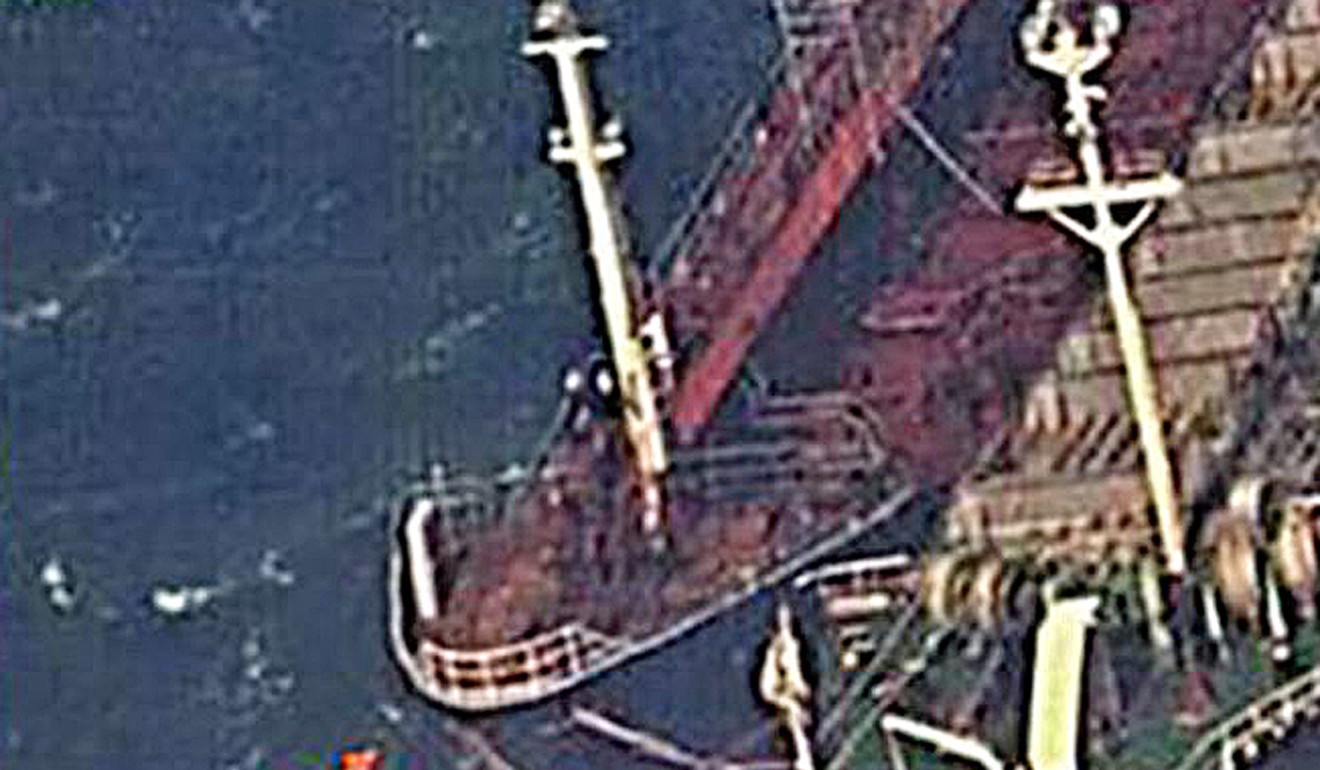
South Korea seizes Hong Kong tanker after ‘oil delivery to North Korean ship’
Officials in Seoul say fuel transfer in October violated UN sanctions on Pyongyang
South Korean customs authorities seized and inspected a Hong Kong-registered tanker last month after it secretly transferred oil to a North Korean vessel in international waters, officials in Seoul said on Friday.
The officials said the Lighthouse Winmore was inspected when it entered the South Korean port of Yeosu on November 24, after transferring 600 tonnes of refined oil to a North Korean vessel on October 19, Yonhap News Agency reported.
The ship’s 25 crew members – 23 Chinese nationals and two from Myanmar – were being held at Yeosu but would be allowed to leave South Korea after the authorities finished questioning them, the official said.
China’s foreign ministry said it was not aware of the incident in South Korea.
It also denied that any Chinese vessel had been involved in any oil transfer at sea in October.
“China has launched an investigation following reports that a Chinese ship transferred oil to a North Korean ship in international waters on October 19,” ministry spokeswoman Hua Chunying said.
“The ship has not stopped at a Chinese port since August, and there is no record of it leaving or entering a Chinese port. We are not aware if the ship has visited ports operated by other nations.”
Hua said Beijing had fully implemented United Nations resolutions and China would not allow companies or individuals to violate the sanctions.

The South Korean official said the Hong Kong-flagged tanker was chartered by Taiwanese company Billions Bunker Group and docked in Yeosu on October 11 to load up on Japanese refined oil before heading towards its purported destination in Taiwan.
But instead of going to Taiwan, the tanker transferred the oil to North Korea’s Sam Jong 2 and three other non-North Korean vessels in international waters, the official said.
The official said the crew was ordered by the Taiwanese group to transfer the oil, but the reason for the transaction was not known.
The ship-to-ship transfer of any goods for North Korea is a violation of a UN Security Council resolution adopted against Pyongyang in September.
“The actions taken will be reported to the UNSC sanctions committee on North Korea in the future,” the report quoted an official as saying. “This marks a typical case of North Korea shrewdly circumventing UNSC sanctions by using its illegal networks.”
Taiwan Presidential Office spokesman Alex Huang said its agencies had confirmed that Billions Bunker Group was not incorporated in Taiwan.
“As a responsible member of international society, Taiwan will continue to fully comply with all UN sanctions against North Korea, in order to support peace and stability in the region,” he said.

Lighthouse Winmore is reportedly one of the 10 ships the United States had called on the United Nations to blacklist.
Open sources, including MarineTraffic and VesselFinder, said the Lighthouse Winmore left the Taiwanese city of Taichung on November 6 and arrived back in Yeosu on November 24.
The Lighthouse Winmore is owned and managed by two Hong Kong-registered companies: Win More Shipping and Lighthouse Shipping Development.
According to the Hong Kong Companies Registry, the companies are registered at different addresses in Guangzhou, with Gong Ruiqiang named as the director of both companies.
Gong owns 80 per cent of Lighthouse Shipping, with the rest owned by Zeng Haibo, a person registered at an address in Guangzhou.
Gong could not be contacted at either company’s registered phone numbers in Hong Kong. Win More’s company secretary said the firm did not operate in the city.
Hong Kong’s Commerce and Economic Development Bureau said it was in contact with South Korean authorities over the tanker’s seizure.
It also said the Hong Kong government strictly implemented UN Security Council sanctions.
“[The Hong Kong government] has been staying highly vigilant about activities and suspected cases that may violate UNSC sanctions. Our law enforcement agencies will closely follow up on suspected violations,” the bureau said.
South Korean media reported this week that US reconnaissance satellites had spotted Chinese and North Korean ships illegally transferring oil about 30 times since October.
On Thursday, US President Donald Trump accused China of violating sanctions meant to halt North Korea’s nuclear weapons programme.
Speaking later to The New York Times, Trump said he had “been soft” on China regarding trade in the hope that its leaders would do more to rein in North Korea. He called on China “to help us much more” and signalled he might otherwise take punitive trade actions.
“If they don’t help us with North Korea, then I do what I’ve always said I want to do,” Trump said. Chinese defence ministry spokesman Ren Guoqiang denied China was involved in an illicit trade with North Korea, saying China and its military strictly enforced the UN resolutions on Pyongyang.
A North Korean specialist from Jilin University said Trump was trying to pile up pressure on Beijing.
“Washington was not satisfied with the most recent UN resolution because it still allows a very limited oil supply to North Korea,” the analyst said.
“Trump might be using this incident to further pressure Beijing to stop all supplies to Pyongyang.”
Zhang Tuosheng, director of the Centre for Foreign Policy Studies at the China Foundation for International and Strategic Studies, said there was still no confirmation that the transfer was linked to the Chinese government.
“There are profits to be made from private smuggling of oil to North Korea. The Chinese government cannot easily it monitor it. We need more details to know if it’s a state act or the work of individuals,” Zhang said.
Additional reporting by Lawrence Chung in Taipei


